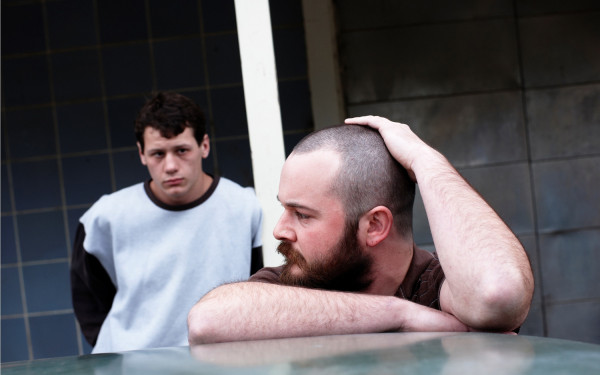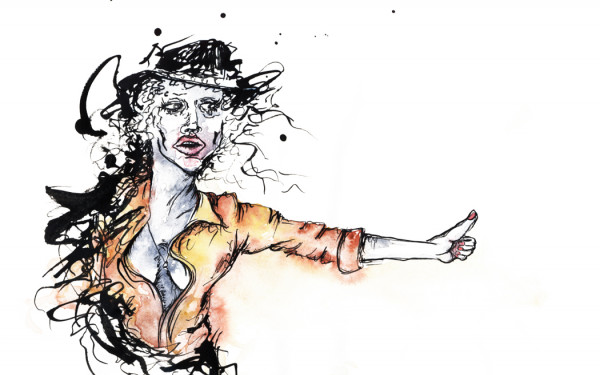Early Winter: A Freezing Look Into Marital Drama
Director Michael Rowe Discusses Chilling Realism in Film
The awkwardness settles in with a close-up on an intimate slice of life—a non-reciprocal orgasm.
The scene is set in an isolated house somewhere in Quebec. Devoid of communication and music, Early Winter is a sharp and glacial experience.
Australian director Michael Rowe’s spine-chilling third feature film, which won the 2015 Venice Days Award, is as motionless as it is intense—it’s no wonder the Canadian release of the film is set for Jan. 29.
Rowe’s latest film is the story of a complete rediscovery of love and commitment. In Early Winter, he juggles the different emotional stages and seasons that can be found in a long-term relationship.
A discussion of Canada’s long winters with Serge Noel, the film’s producer, planted the idea in Rowe’s head.“The pressure of a long winter on a long-term relationship must be a way to push things over the edge,” Rowe said.
“It was interesting to explore that.” The main characters, David and Maya, are a couple like any other. David’s willingness to give himself over completely to his family would send shivers down anyone’s spine.
After moving away from her native Russia, Maya tries to compensate for having no frame of reference in a new culture by amassing every latest gadget. Surrounded by a messy apartment and overwhelming technology, the relationship soon slips into an icy silence.
“I think that society, as we perceived it up until 30 years ago, was based on personal contact, and going out in the streets and now people feel like by putting a ‘like’ on Facebook they’ve done their duty,” Rowe said.
Maya’s obsessive materialistic needs are destroying what’s left of the couple’s bond. After the absence of words—dialogue is minimalist—comes the absence of music.
Rowe’s distinctive style is an intrusive approach to relationships, a shivering way of getting to the core with the human condition, without the artificial jelly found in cheesy comedies.
“I think music is used generally to intensify emotions that the audience feels, and I like to be as purist in that sense as I can,” Rowe asserted. “I believe that cinema is constituted of good acting, and a good script. Putting music over the top is cheating.”
The confined space and sound in which the characters are trapped is suffocating. Rowe explores the inability to communicate from a minimalist, almost visceral, perspective.
“I think we have been mis-educated in expecting to have everything explained to us, and I don’t believe in narratives that do that. It’s artificial,” Rowe affirmed. “I choose to explain the minimum. I wanted the audience to feel what they [the characters] feel, the frustration.”
“The pressure of a long winter on a long-term relationship must be a way to push things over the edge.”
When asked about the film’s protagonists, Rowe explained that some people in real life can be more likeable than others. He flirts with documentary style by staying as close as he can to the reality of human interaction.
The experienced lead actors—Suzanne Clément and Paul Doucet—are a winning combination. They deliver a dazzling performance of a couple’s highway to hell. But by dawdling on the acting and the exhaustion of the relationship with long-take shots, Rowe’s hallmark, the story takes times to settle.
A closer look at a frigid Maya reveals that barging into a character’s life doesn’t mean laying her bare emotionally. While David—a jealous man weakened by a heavy past—is in freefall, Maya sinks into the contemplation of her own downfall.
Rowe’s philosophy of cinema is tied to honesty, especially when it comes to working with the actors.
“I don’t believe in rehearsing, but we try to create an organic and creative process, by talking about the characters, the script and our personal lives,” he said. Winning the Venice Days Award, Early Winter is a source of pride for the 44-year-old Australian director.
“It’s always gratifying on such personal films that are so close to my own frustrations and pains to know that it’s not just me, that things find resonance in the emotions and hearts of other people,” Rowe explained.
“That’s what the prize represents for me.” After his films Leap Year in 2010 and The Well in 2013, Rowe closes what he refers to as his trilogy of solitude with an emblematic definition of the Western contemporary loneliness.
“Loneliness is one of the most difficult and irreducible conditions of the human being, and many manifestations of art are based in loneliness, particularly cinema,” Rowe emphasized.
His key themes, isolation and immigration, converge in a bilingual cinematographic experience where both Clément and Rowe had to cope with the language barrier. Rowe described it as a challenge to work both in French and English in a Quebec context.
The character David illustrates the overall misunderstanding of this Early Winter with one of the most powerful lines on longterm relationship: “Quand ça fait un bout de temps qu’on est ensemble, c’est normal qu’il y ait moins de passion… c’est là que l’engagement commence.”

2_900_632_90.jpg)
1_900_665_90.jpg)



_600_375_90_s_c1.jpg)
